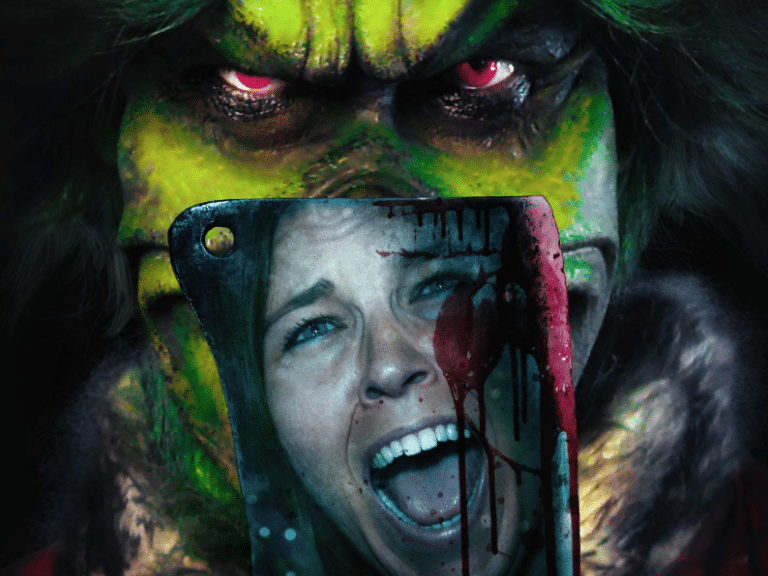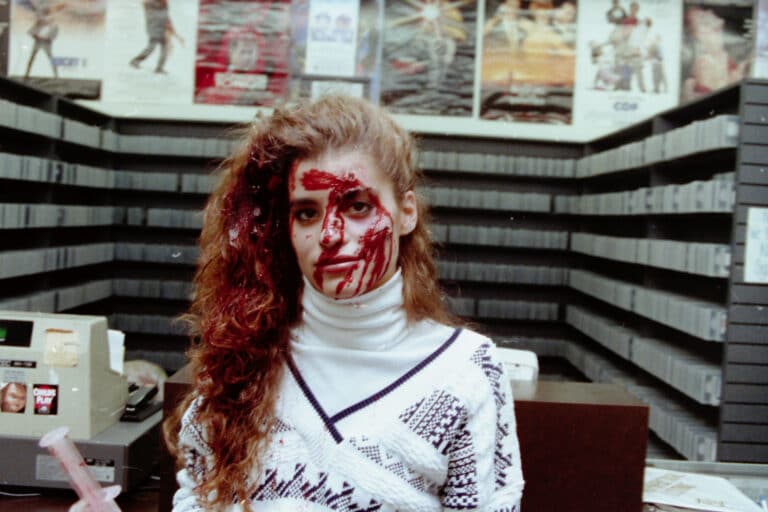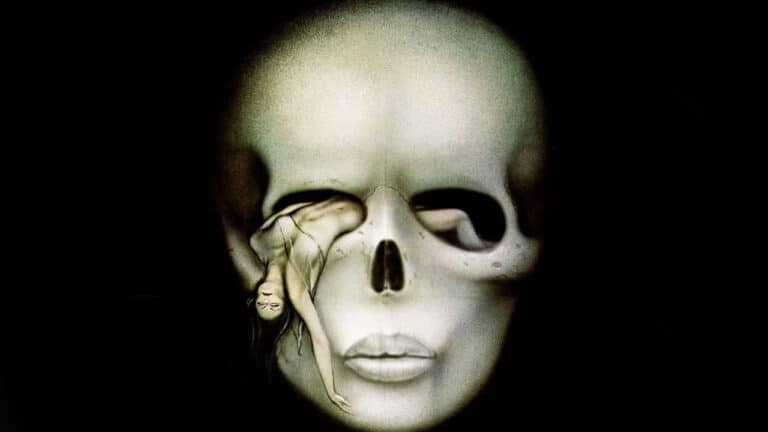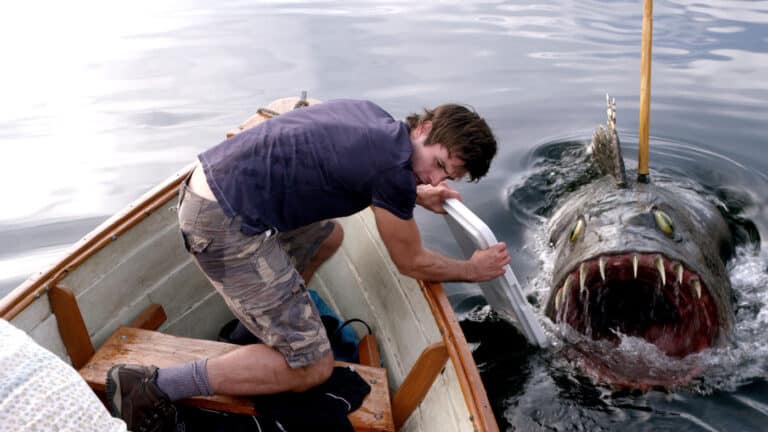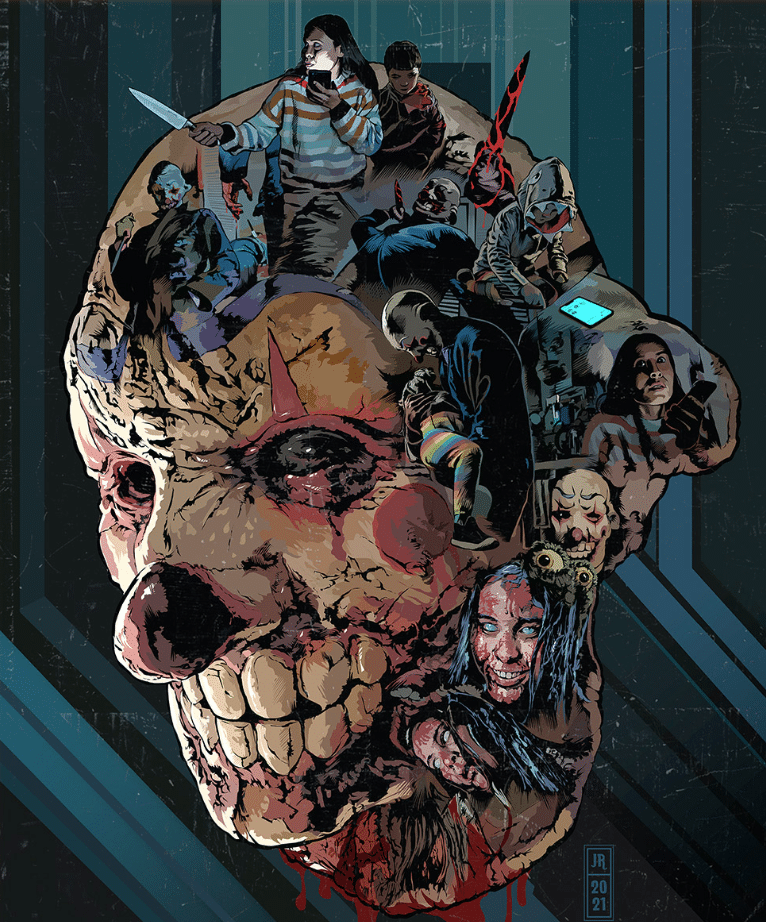
A global catastrophe is the backdrop of a very contained study of tension and terror in Humane, the feature directorial debut of Caitlin Cronenberg. FANGORIA chatted with Cronenberg and her lead actors Jay Baruchel and Emily Hampshire about the movie, releasing in select theaters from IFC Films.
Cronenberg took the helm of Humane, scripted and produced by Michael Sparaga, following a couple of decades of photography work. This has included shooting stills on movies ranging from Bruce McDonald’s Pontypool to Denis Villeneuve’s Enemy, along with numerous films by her father David and brother Brandon.
In Humane, Baruchel and Hampshire play Jared and Rachel, two of the grown children of Charles York (Peter Gallagher), who summons his family to his expansive home under severe circumstances. A worldwide ecological disaster has led the government to initiate a voluntary euthanasia program to cull the population, and Charles brings Jared, Rachel and their siblings Noah (Sebastian Chacon) and Ashley (Alanna Bale) together to announce that he and his second wife Dawn (Uni Park) have decided to sacrifice themselves for the good of the world. That news is upsetting enough, but when an unexpected turn leads Bob (Enrico Colantoni), the agent in charge of retrieving the bodies, in need of another corpse, tensions rise among the siblings and boil over into violence.
How did you each get involved with Humane?
Caitlin Cronenberg: I was sent the script by our lovely writer and producer Michael Sparaga, fell in love with the idea and the concept, and then spent the next four years making it happen.
Emily Hampshire: I believe I got a text from Caitlin saying, “Would you be in my movie?” Having no idea what it was about or anything, and I just said yes. Then I read it, and I was so glad it was great [laughs]. Then I texted Jay…
Jay Baruchel: Yeah, I was just reading a book and Emily texted me, and then Caitlin. Basically, the content was the same: They’re making a movie, and I should do it with them. And they’re two people whose company I greatly enjoy. I’ve known Emily a very long time, and have made a bunch of shit with her, so it was just like, yeah! Then I read it, and I loved it, and it was clear I had to be in this movie.
EH: Jay and I have done a lot of movies together, but we’ve never played siblings. And I’ve always felt like that is totally our relationship, so I was very happy this opportunity came about.
Had either of you worked with Caitlin before this?
EH: I’ve done photo shoots and stuff…
CC: I did unit stills on Cosmopolis and met them both, I think, for the first time on that. And I had done other portraits and photos with them; Emily is in my book The Endings, I did stills on Jay’s series Man Seeking Woman. So I had known them both for a long time in other contexts.
You’ve worked with some great filmmakers over the course of your still photography career. How did that experience inform the way you directed Humane?
CC: Every set I had the opportunity to step on was an invaluable learning experience. Most of the unit stills I did were actually before I thought about being a director, so it’s been a lot of learning by osmosis and getting the general sense of what works for people, what doesn’t work for people, what casts and crews respond to, the kind of set you enjoy being on, and not being on as well.
I’ve had a lot of interesting experiences, because when you’re the stills photographer, you are one of the least important crew members to everybody else. Everybody hates you, you’re everybody’s worst enemy, you’re in everybody’s eyeline. It’s an interesting role to have on a film, working with actors in that capacity, and then becoming a director and understanding why everybody feels that way. I tried to be really nice toward our still photographers [laughs].
Your family is known for explicit body horror, and this is a more psychological film–for most of the running time, anyway. How do you see Humane fitting into the family tradition, or were you specifically trying to do something different?
CC: I didn’t try, honestly, to do anything related or unrelated. I just wanted to make the film I wanted to make. And, you know, a certain amount of gore just felt right. Maybe it’s my upbringing, maybe it’s just the way I am. I think coming into Humane with a lot of expectations will have some people feeling disappointed, because I’m very different from my dad and my brother in terms of the art I’m trying to make. This is not a movie I think either of them ever would have made, which is a good thing. I’m happy to be there.
JB: I will say, she did talk me into pinching my nipples. Typically I would say no to that sort of thing [laughs], but…
EH: Would you say no to David if he asked you to pinch your nipples?
JB: No, no, certainly not!
CC: That’s a skill I learned from my family: getting people to do things that otherwise might make them uncomfortable, and then still having them trust you after.
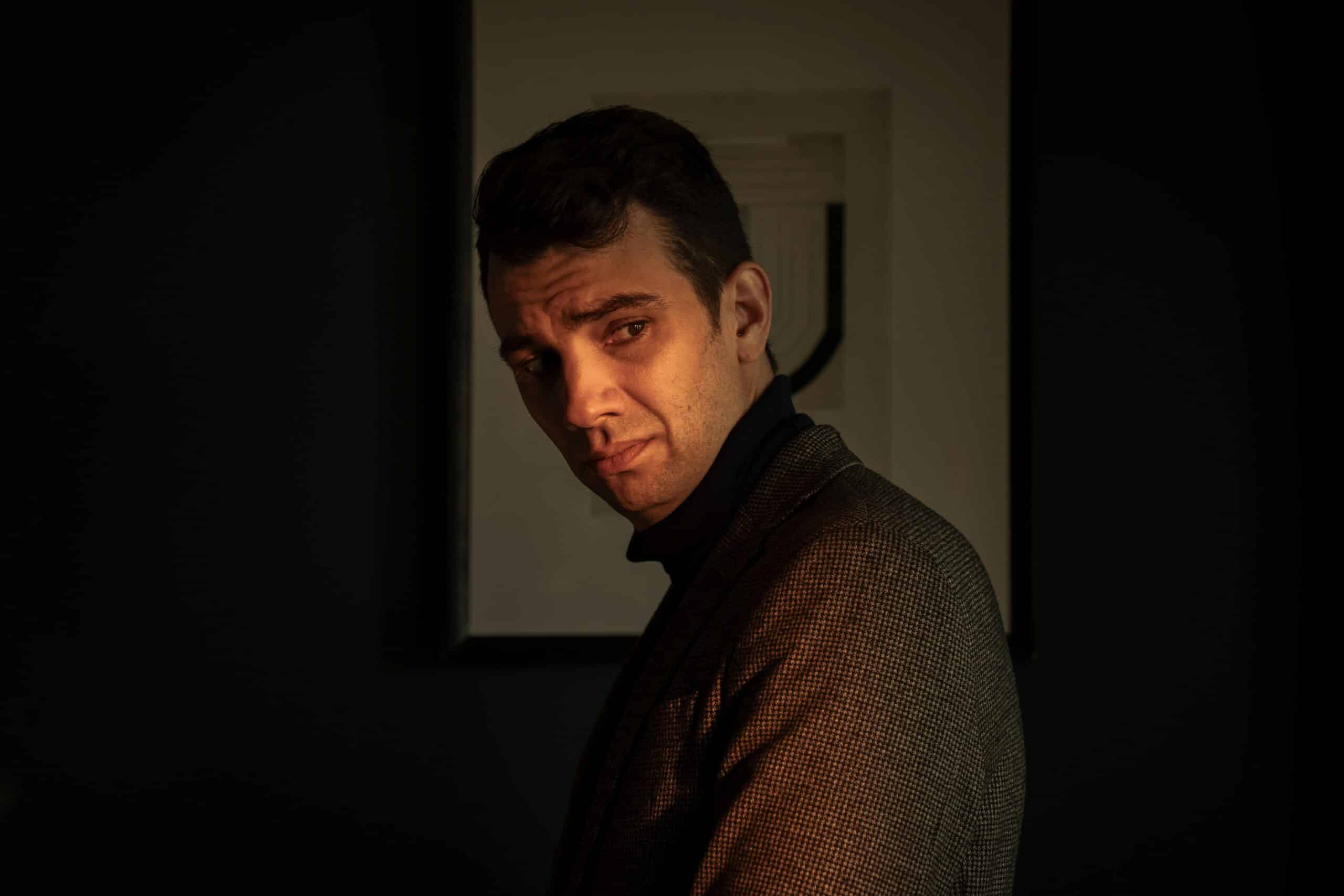
Were all your cast first choices, or did you have an audition process for any of them? How was it putting together an ensemble that was not just right for their parts but also right together as a whole?
CC: Well, it was first choices for these two, and Enrico Colantoni playing Bob. The actors playing the other siblings were people I hadn’t worked with before and didn’t know personally, so there was a bit of an audition process. But having Emily and Jay as the elder two really helped with the choices for the rest of the cast, including Peter Gallagher as their father, because I wanted a dad who would make sense with all these siblings.
Ultimately, I feel like we got first choices everywhere; some of them were just not the choices I knew I wanted until I was exposed to their work and to them as people. The family dynamic felt very strong, and the idea that the two older siblings and the two younger siblings have their individual relationships, and there’s a bit of rivalry in those two cliques, made it even more fun to cast.
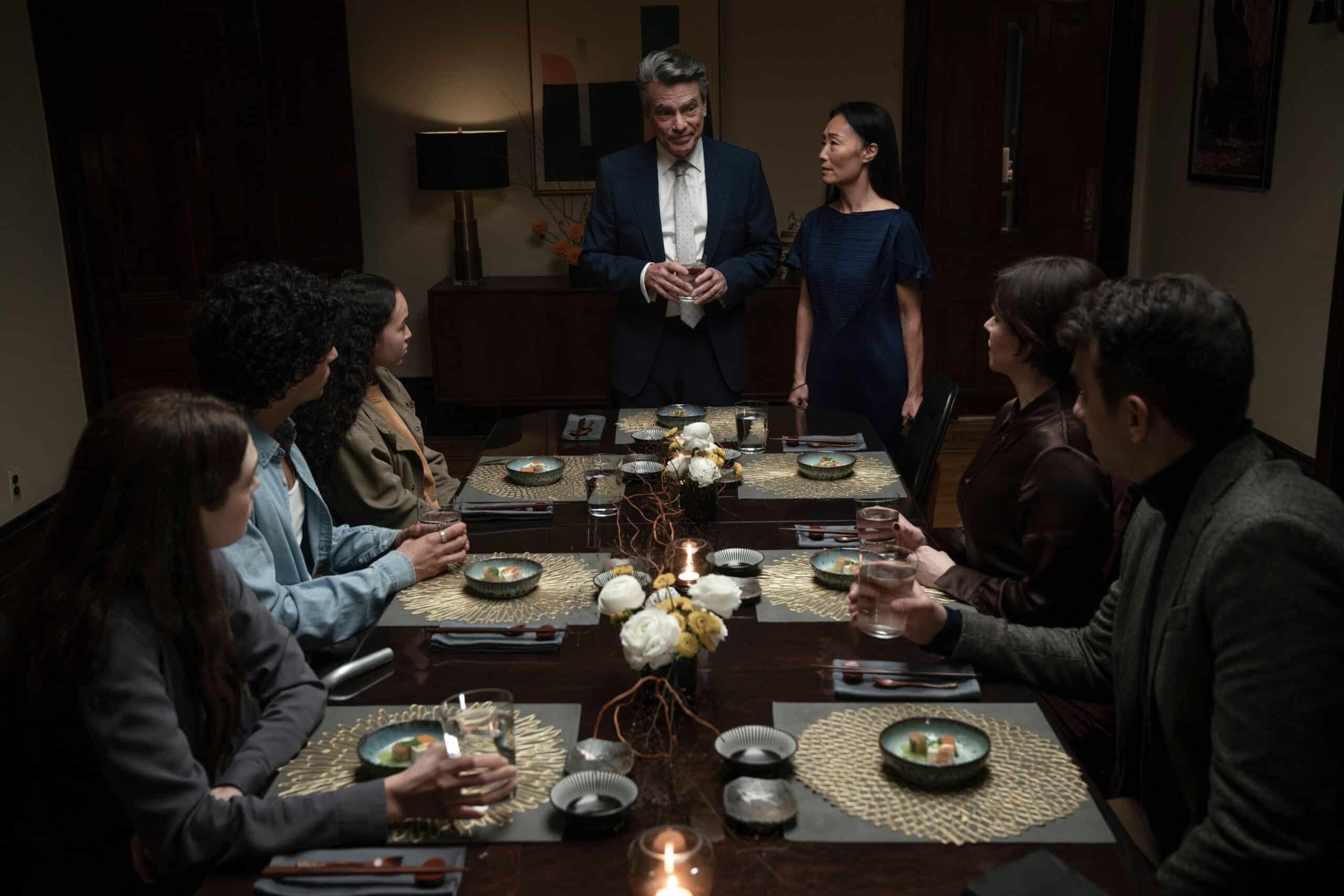
Emily and Jay, how did you create that dynamic between yourselves and then with your other onscreen family members?
JB: Well, Emily and I have been talking shit to each other and bickering for, I don’t know, somewhere between 15 and 20 years. It’s been a while!
EH: Yeah, I feel like that came naturally to us, and that’s why I forced–well, I didn’t force you to be in it, but I was like, “You have to do this!” because I didn’t want to have to work at forming that relationship with anybody else [laughs].
JB: Agreed! It’s a very easy shorthand that we’ve been adding to and evolving for quite some time. And then it was a question of seeing if we could find the similar music with Alanna and Sebastian and Peter and Enrico, and we did, it was really cool. Something I need to stress is when you make an independent movie, you don’t have a ton of time. So we didn’t have a lot of opportunities to rehearse or anything, and we had to figure out that lived-in feeling as quickly as possible. The music’s either going to be there or it isn’t, and we’re very lucky that it was.
How about getting into the more violent scenes toward the end?
CC: We actually shot that first! The scheduling had us shooting the end of the movie at the beginning, which also helped to bond the family members together. There were stunt rehearsals, more time spent doing that kind of stuff, to make sure everybody was safe. And that gave us a bit more time for everybody to be together–putting their hands on each other, strangling and all that fun stuff!
EH: I believe that is a good way to kind of bond, if you don’t have the time to do acting rehearsals to form a family unit. If you just get right into fighting, that just helps the relationships be natural.
CC: One thing that was important to me, when addressing the fighting, was that it wouldn’t be “beautiful,” if you know what I mean; that there was still awkwardness. Because if you asked me to stab my brother, even if it’s to save myself, I would really have a hard time doing that, obviously.
So we sort of added that awkwardness to say, yeah, we’re not going to perfectly coordinate these stunts, keeping in mind that it’s actually not easy to hit someone. I should add that Jay is amazing at falling down and getting hit. His stunt abilities were quite impressive. He never needed his stunt double to do those things, unless the producers made us, because they were worried about him actually getting hurt.
EH: Yeah, he manages to make it real and funny and painful at the same time, which is a feat. It’s amazing.
JB: Oh, stop, you two! I adore that [physical] stuff, I always have, and it’s as simple as, when I was in grade seven and eight, and I stopped growing and nobody else did, my way of getting guys to not beat me up would be to beat myself up.
Few things are more seminal for me than Michael Richards on Seinfeld, and Mr. Bean. I love eating it, I love fucking getting my ass kicked. I typically play defense against my physicality anyway, so when I can find a way to do something with that, all the better.
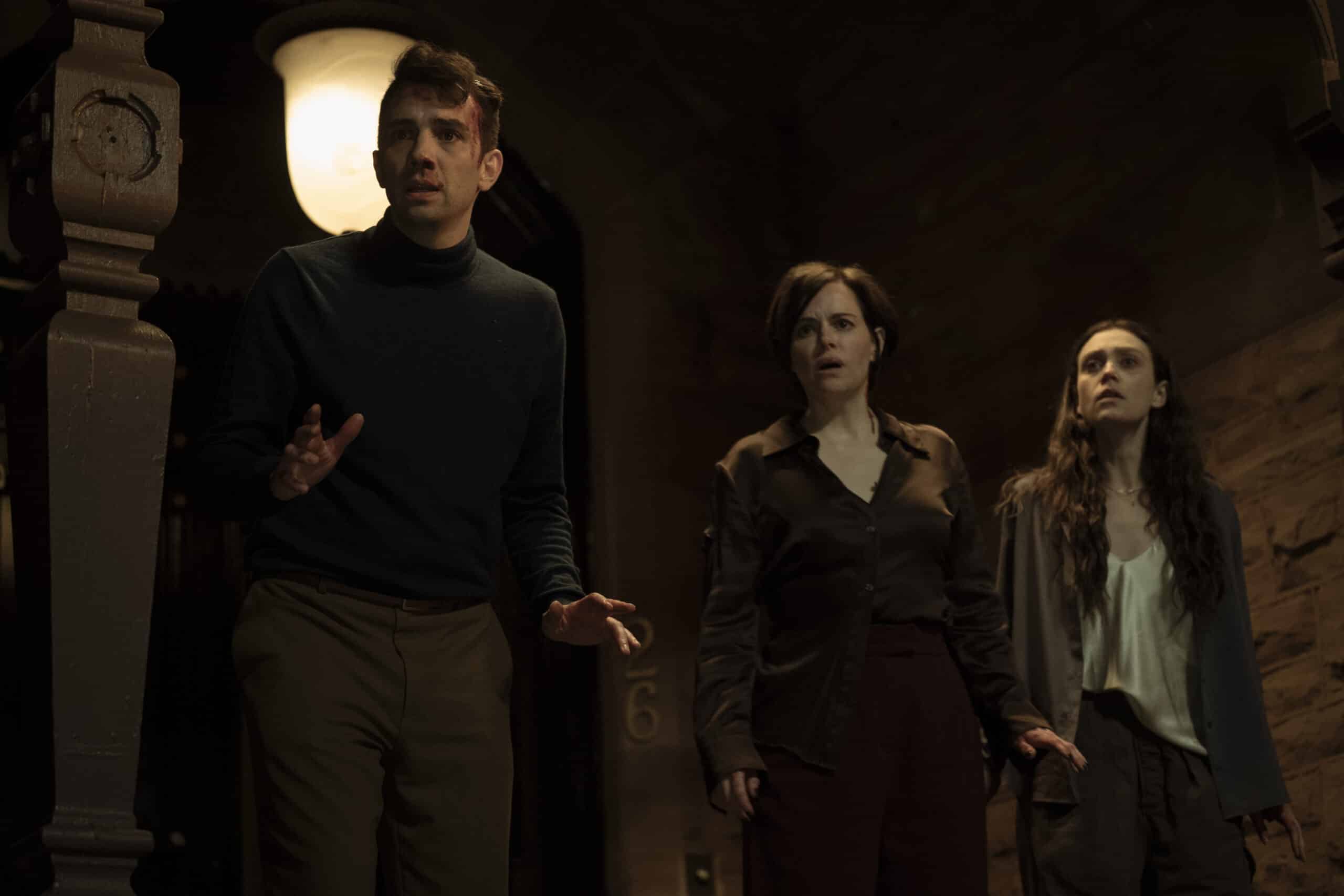
How hard was it to find a house that looked right, could accommodate the production, and would let you seriously mess it up in the latter portions?
CC: It was, weirdly, not that hard. I think we maybe looked at three or four locations, and this one was at one point on the table, and then it was off the table, and everything felt wrong when we didn’t have it. The first time Michael and I drove up to this place, he looked at me and said, “Bad things happened here.” [Laughs] That was when we knew we had to do anything we could to get into that location.
It’s a Gothic house, and the neighborhood was built around it. And we knew that it would be a character in the film as much as any of the people, so we lucked out in a major way. Michael had written it for a more Georgian Colonial layout with a central hall, so when we found this house, we got a floor plan and reimagined where all the action would come from. And, you know, we did paint the walls, and were very careful about getting blood on the floor.
Humane addresses themes that are very topical in the world right now. And the press notes reveal it was conceived before the pandemic and then made after. Can you talk about how you see the ideas in this movie relating to the real world?
CC: Yes, this was written pre-pandemic, and then as Michael and I started having conversations about the script, that’s when Covid first hit. So the idea that it’s more of an environmental collapse than a disease or pandemic made it feel far enough from what we were living through that we still wanted to do it. There were certainly aspects of the world-building that we borrowed from reality, and as we continued, the headlines Michael would send me and I would send him felt like they could have been straight out of our movie. It was not hard for us to find footage of glaciers melting and forest fires and that kind of thing.
So is the world headed that way? Well, all signs point, in terms of the environment, to yes; all of this is already happening. Will we ever get to a point where the kinds of measures you see in the movie are necessary? It’s obviously unlikely, but the idea that drastic measures might need to be taken at some point does feel like something that could happen. And how would the world respond to that? Probably pretty badly.
EH: I did love that about Humane, that it’s kind of a possible near future. I love stuff like Black Mirror where you’re like, this could happen. Even though our movie does go to an extreme, it’s not that extreme, I don’t think. Especially the moments where everybody’s carrying umbrellas to protect against the sun. It seems believable to me, so I like that.
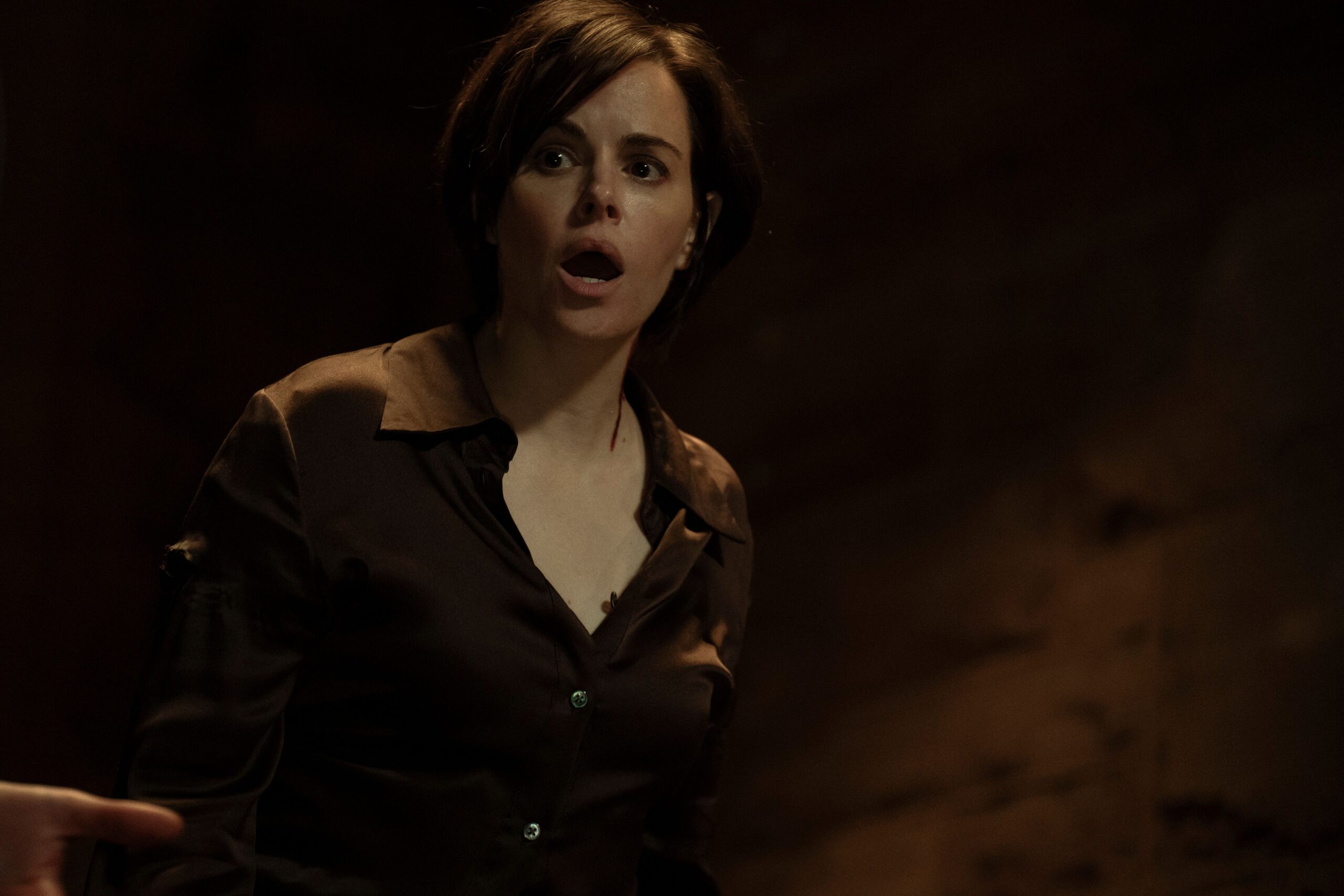
JB: Yeah, I certainly think we will find a way to fuck up our response to just about anything. And the movie is a bit of a meditation on our inherent inability to deal with fear and anxiety. We deal with shit when it’s too late, and in an extreme way that is maybe not necessarily the most efficient way to do it, and is also quite detrimental in its own way.
It’s kind of like a nightmare version of recycling boxes, you know? The world is ending, so you empty your pop cans and put them out in the recycling bin twice a month, and then you’re like, “OK, I’m good. I’m a good person,” right? That’s kind of what this is, taken to a satirical extreme. But again, like Emily said, it’s not that extreme. And that’s why it resonates; it feels like we’re one bad week away from this movie being real.
Humane is now playing in select theaters, watch the trailer right here.


